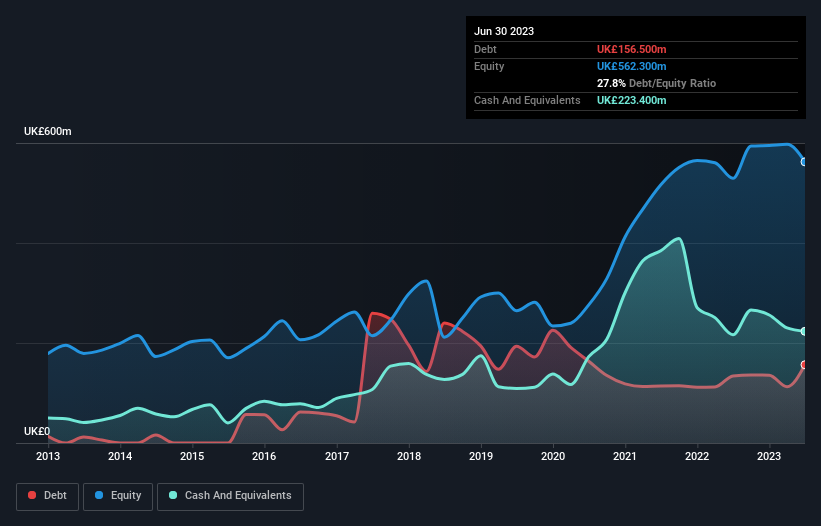
Warren Buffett famously said, 'Volatility is far from synonymous with risk.' It's only natural to consider a company's balance sheet when you examine how risky it is, since debt is often involved when a business collapses. Importantly, Kindred Group plc (STO:KIND SDB) does carry debt. But is this debt a concern to shareholders?
When Is Debt Dangerous?
Generally speaking, debt only becomes a real problem when a company can't easily pay it off, either by raising capital or with its own cash flow. Part and parcel of capitalism is the process of 'creative destruction' where failed businesses are mercilessly liquidated by their bankers. However, a more usual (but still expensive) situation is where a company must dilute shareholders at a cheap share price simply to get debt under control. Of course, the upside of debt is that it often represents cheap capital, especially when it replaces dilution in a company with the ability to reinvest at high rates of return. The first step when considering a company's debt levels is to consider its cash and debt together.
Check out our latest analysis for Kindred Group
What Is Kindred Group's Debt?
The image below, which you can click on for greater detail, shows that at June 2023 Kindred Group had debt of UK£156.5m, up from UK£134.2m in one year. However, it does have UK£223.4m in cash offsetting this, leading to net cash of UK£66.9m.

How Healthy Is Kindred Group's Balance Sheet?
Zooming in on the latest balance sheet data, we can see that Kindred Group had liabilities of UK£365.6m due within 12 months and liabilities of UK£212.6m due beyond that. Offsetting these obligations, it had cash of UK£223.4m as well as receivables valued at UK£111.9m due within 12 months. So its liabilities outweigh the sum of its cash and (near-term) receivables by UK£242.9m.
Since publicly traded Kindred Group shares are worth a total of UK£1.56b, it seems unlikely that this level of liabilities would be a major threat. However, we do think it is worth keeping an eye on its balance sheet strength, as it may change over time. While it does have liabilities worth noting, Kindred Group also has more cash than debt, so we're pretty confident it can manage its debt safely.
And we also note warmly that Kindred Group grew its EBIT by 19% last year, making its debt load easier to handle. There's no doubt that we learn most about debt from the balance sheet. But ultimately the future profitability of the business will decide if Kindred Group can strengthen its balance sheet over time. So if you're focused on the future you can check out this free report showing analyst profit forecasts.
But our final consideration is also important, because a company cannot pay debt with paper profits; it needs cold hard cash. Kindred Group may have net cash on the balance sheet, but it is still interesting to look at how well the business converts its earnings before interest and tax (EBIT) to free cash flow, because that will influence both its need for, and its capacity to manage debt. During the last three years, Kindred Group generated free cash flow amounting to a very robust 91% of its EBIT, more than we'd expect. That positions it well to pay down debt if desirable to do so.
Summing Up
Although Kindred Group's balance sheet isn't particularly strong, due to the total liabilities, it is clearly positive to see that it has net cash of UK£66.9m. And it impressed us with free cash flow of UK£128m, being 91% of its EBIT. So we don't think Kindred Group's use of debt is risky. There's no doubt that we learn most about debt from the balance sheet. However, not all investment risk resides within the balance sheet - far from it. Case in point: We've spotted 2 warning signs for Kindred Group you should be aware of.
At the end of the day, it's often better to focus on companies that are free from net debt. You can access our special list of such companies (all with a track record of profit growth). It's free.
Valuation is complex, but we're here to simplify it.
Discover if Kindred Group might be undervalued or overvalued with our detailed analysis, featuring fair value estimates, potential risks, dividends, insider trades, and its financial condition.
Access Free AnalysisHave feedback on this article? Concerned about the content? Get in touch with us directly. Alternatively, email editorial-team (at) simplywallst.com.
This article by Simply Wall St is general in nature. We provide commentary based on historical data and analyst forecasts only using an unbiased methodology and our articles are not intended to be financial advice. It does not constitute a recommendation to buy or sell any stock, and does not take account of your objectives, or your financial situation. We aim to bring you long-term focused analysis driven by fundamental data. Note that our analysis may not factor in the latest price-sensitive company announcements or qualitative material. Simply Wall St has no position in any stocks mentioned.
About OM:KIND SDB
Kindred Group
Operates an online gambling business in Europe, North America, and Australia.
High growth potential with excellent balance sheet.
Similar Companies
Market Insights
Community Narratives



